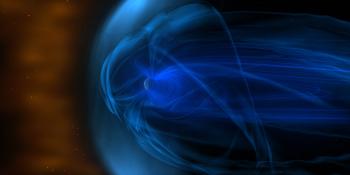Viewing archive of Wednesday, 17 July 2002
Solar activity report
Any mentioned solar flare in this report has a scaling factor applied by the Space Weather Prediction Center (SWPC). Because of the SWPC scaling factor, solar flares are reported as 42% smaller than for the science quality data. The scaling factor has been removed from our archived solar flare data to reflect the true physical units.
Report of Solar-Geophysical Activity 2002 Jul 17 2200 UTCPrepared by the NOAA © SWPC and processed by SpaceWeatherLive.com
Joint USAF/NOAA Report of Solar and Geophysical Activity
SDF Number 198 Issued at 2200Z on 17 Jul 2002IA. Analysis of Solar Active Regions and Activity from 16-2100Z to 17-2100Z Solar activity was at high levels. Region 30 (N19W25)
produced an M8/1b flare at 17/0713 UTC with an associated Type II
radio burst. A CME was associated with this event but there does
not appear to be an Earth directed component. Region 30 has shown
slight decay in the leader spots but remains a large
beta-gamma-delta spot group. As Region 36 (S09E51) rotates further
into view it has developed into a moderately sized spot group with a
beta-gamma-delta magnetic configuration. Activity from Region 36 so
far has been C-Class events.
IB. Solar Activity Forecast
Solar activity is expected to be
moderate. Region 30 and Region 36 are expected to produce M-class
activity. They are also capable of producing a major flare during
the period.
IIA. Geophysical Activity Summary 16-2100Z to 17-2100Z
The geomagnetic field has been quiet to active. A sudden impulse
occurred at 17/1604 UTC and measured 18 nT on the San Juan
magnetometer. Active conditions followed the sudden commencement.
Greater than 10 MeV protons exceeded the 100 pfu threshold at
17/1250 UTC, reached a peak value of 234 pfu at 17/1600 UTC and
ended at 17/1710 UTC. Greater than 10 MeV protons remain above the
10 pfu threshold as of this forecast issue. A PCA event began at
16/2215 UTC and reached a peak absorption 4.8 Db on the Thule 30 MHz
riometer. Greater than 2 MeV electron at geo-synchronous orbit
reached moderate levels.
IIB. Geophysical Activity Forecast
The geomagnetic field is
expected to be quiet to active. Active conditions are possible
early on day one due to the CME shock from the X3 event on 15 July.
Isolated active conditions are possible on day three due to coronal
hole effects and the possibility of a weak shock from the M8 event
earlier today. The greater than 10 MeV proton event is expected to
continue to decline and should end on day one of the forecast
period. The PCA event in progress is expected to last until 19/0000
UTC. Maximum daytime absorption is expected to be about 6 Db, while
maximum nighttime adsorption will be about 2 Db.
III. Event Probabilities 18 Jul to 20 Jul
| Class M | 75% | 75% | 75% |
| Class X | 20% | 20% | 20% |
| Proton | 99% | 50% | 15% |
| PCAF | in progress | ||
IV. Penticton 10.7 cm Flux
Observed 17 Jul 180 Predicted 18 Jul-20 Jul 180/190/185 90 Day Mean 17 Jul 161
V. Geomagnetic A Indices
Observed Afr/Ap 16 Jul 009/011 Estimated Afr/Ap 17 Jul 020/020 Predicted Afr/Ap 18 Jul-20 Jul 015/015-010/012-012/020
VI. Geomagnetic Activity Probabilities 18 Jul to 20 Jul
| A. Middle Latitudes | |||
|---|---|---|---|
| Active | 40% | 25% | 25% |
| Minor storm | 20% | 10% | 05% |
| Major-severe storm | 10% | 01% | 01% |
| B. High Latitudes | |||
|---|---|---|---|
| Active | 45% | 30% | 30% |
| Minor storm | 20% | 15% | 15% |
| Major-severe storm | 10% | 05% | 05% |
All times in UTC
Latest news
Latest forum messages
AR4064 182025/04/12-13 Filament CMEs 2025/04/16 G3 Watch 545Incoming & Unnumbered Active Regions 1765Line chart of indicators on the auror video, animated graph trace 23Coronal holes 71
More topicsSupport SpaceWeatherLive.com!
A lot of people come to SpaceWeatherLive to follow the Sun's activity or if there is aurora to be seen, but with more traffic comes higher server costs. Consider a donation if you enjoy SpaceWeatherLive so we can keep the website online!

Space weather facts
| Last X-flare | 2025/03/28 | X1.1 |
| Last M-flare | 2025/04/18 | M4.4 |
| Last geomagnetic storm | 2025/04/16 | Kp8- (G4) |
| Spotless days | |
|---|---|
| Last spotless day | 2022/06/08 |
| Monthly mean Sunspot Number | |
|---|---|
| March 2025 | 134.2 -20.4 |
| April 2025 | 120.1 -14.1 |
| Last 30 days | 116.4 -25.9 |


